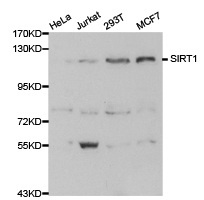SIRT1 Rabbit Polyclonal Antibody
USD 665.00
USD 200.00
USD 867.00
Specifications
| Product Data | |
| Applications | ICC/IF, WB |
| Recommended Dilution | WB 1:500 - 1:2000;IF 1:50 - 1:200 |
| Reactivities | Human, Mouse |
| Host | Rabbit |
| Isotype | IgG |
| Clonality | Polyclonal |
| Immunogen | C term -peptide of human SIRT1 |
| Formulation | Store at -20C or -80C. Avoid freeze / thaw cycles. Buffer: PBS with 0.02% sodium azide, 50% glycerol, pH7.3 |
| Concentration | lot specific |
| Purification | Affinity purification |
| Conjugation | Unconjugated |
| Storage | Store at -20°C as received. |
| Stability | Stable for 12 months from date of receipt. |
| Gene Name | sirtuin 1 |
| Database Link | |
| Background | The Silent Information Regulator (SIR2) family of genes is a highly conserved group of genes that encode nicotinamide adenine dinucleotide (NAD)-dependent protein deacetylases, also known as class III histone deacetylases. The first discovered and best characterized of these genes is Saccharomyces cerevisiae SIR2, which is involved in silencing of mating type loci, telomere maintenance, DNA damage response, and cell aging. SirT1, the mammalian ortholog of Sir2, is a nuclear protein implicated in the regulation of many cellular processes, including apoptosis, cellular senescence, endocrine signaling, glucose homeostasis, aging, and longevity. Targets of SirT1 include acetylated p53, p300, Ku70, forkhead (FoxO) transcription factors, PPAR?, and the PPAR? coactivator-1a (PGC-1a) protein. Deacetylation of p53 and FoxO transcription factors represses apoptosis and increases cell survival. Deacetylation of PPAR? and PGC-1a regulates the gluconeogenic/glycolytic pathways in the liver and fat mobilization in white adipocytes in response to fasting. SirT1 deacetylase activity is inhibited by nicotinamide and activated by resveratrol. In addition, SirT1 activity may be regulated by phosphorylation, since it is phosphorylated on Ser27 and Ser47 in vivo, however, the function of these phosphorylation sites has not yet been determined. |
| Synonyms | SIR2; SIR2alpha; SIR2L1 |
| Reference Data | |
| Protein Families | Druggable Genome, Stem cell - Pluripotency, Transcription Factors |
Documents
| Product Manuals |
| FAQs |
| SDS |
{0} Product Review(s)
Be the first one to submit a review






























































































































































































































































 Germany
Germany
 Japan
Japan
 United Kingdom
United Kingdom
 China
China




